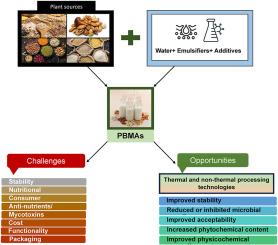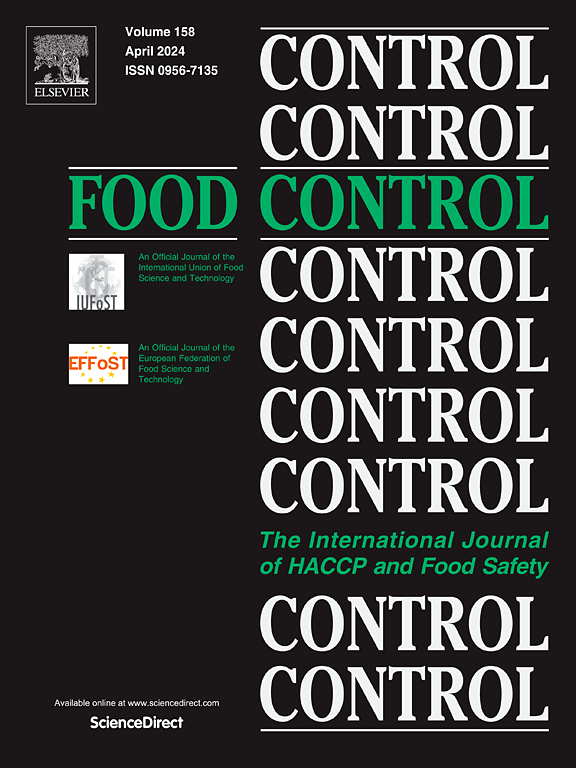Advancing plant-based milk alternatives: Challenges, opportunities, and the role of innovative processing technologies
IF 6.3
1区 农林科学
Q1 FOOD SCIENCE & TECHNOLOGY
引用次数: 0
Abstract
Lactose intolerance, presence of cholesterol, philosophical, ethical, environmental, religious and social beliefs restrict the consumption of dairy-based foods. In this regard, there is rapid growth in the market for plant-based milk alternatives (PBMAs) derived from grains, legumes, seeds, nuts and pseudo-cereals. However, development of plant-based milk is challenging due to stability issues, reducing their antinutrients, off-flavors, allergens, sensory and technological limitations. These challenges limit consumer acceptance and the overall quality of plant-based beverages.
Hence, this review aims to comprehensively examine recent advances in innovative food processing technologies that can effectively address these issues and enhance the nutritional, sensory, and functional qualities of PBMAs. Technologies such as enzyme-assisted extraction, fermentation, high-pressure processing, and novel blending techniques are discussed in detail to highlight their potential in improving product stability, reducing antinutrients, minimizing undesirable flavors, and overcoming allergenic concerns. Moreover, this review highlights the role of blended plant-based milks in enhancing nutritional profiles and improving functional and sensory attributes, all while minimizing the need for synthetic additives and fortification—aligning with consumer demand for cleaner-label, natural products. In light of the rapid growth in plant-based product innovation and a threefold increase in research focused on plant-based diets over the past few years, a thorough understanding of these emerging technologies is essential to meet market and consumer expectations.
As the global shift toward sustainable and health-conscious eating accelerates, PBMAs are increasingly positioned as mainstream alternatives to traditional dairy. This review offers valuable guidance to researchers, product developers, and industry professionals aiming to advance formulation strategies, optimize processing techniques, and ultimately boost consumer acceptance and market success of plant-based milk products.

推进植物性牛奶替代品:挑战、机遇和创新加工技术的作用
乳糖不耐症、胆固醇的存在、哲学、伦理、环境、宗教和社会信仰限制了乳制品的消费。在这方面,从谷物、豆类、种子、坚果和伪谷物中提取的植物性牛奶替代品(pbma)市场正在迅速增长。然而,由于稳定性问题、减少抗营养成分、异味、过敏原、感官和技术限制,植物性牛奶的发展具有挑战性。这些挑战限制了消费者对植物性饮料的接受程度和整体质量。因此,本文旨在全面研究创新食品加工技术的最新进展,这些技术可以有效地解决这些问题,并提高pbma的营养、感官和功能质量。详细讨论了酶辅助提取、发酵、高压加工和新型混合技术等技术,以突出其在提高产品稳定性、减少抗营养成分、减少不良风味和克服过敏问题方面的潜力。此外,本综述强调了混合植物性牛奶在增强营养成分、改善功能和感官属性方面的作用,同时最大限度地减少了对合成添加剂和强化物的需求——与消费者对清洁标签、天然产品的需求保持一致。鉴于植物性产品创新的快速增长以及在过去几年中对植物性饮食的研究增加了三倍,对这些新兴技术的透彻理解对于满足市场和消费者的期望至关重要。随着全球向可持续和健康饮食的转变加速,pbma越来越多地被定位为传统乳制品的主流替代品。这篇综述为研究人员、产品开发人员和行业专业人士提供了有价值的指导,旨在推进配方策略,优化加工技术,最终提高消费者对植物性乳制品的接受度和市场成功。
本文章由计算机程序翻译,如有差异,请以英文原文为准。
求助全文
约1分钟内获得全文
求助全文
来源期刊

Food Control
工程技术-食品科技
CiteScore
12.20
自引率
6.70%
发文量
758
审稿时长
33 days
期刊介绍:
Food Control is an international journal that provides essential information for those involved in food safety and process control.
Food Control covers the below areas that relate to food process control or to food safety of human foods:
• Microbial food safety and antimicrobial systems
• Mycotoxins
• Hazard analysis, HACCP and food safety objectives
• Risk assessment, including microbial and chemical hazards
• Quality assurance
• Good manufacturing practices
• Food process systems design and control
• Food Packaging technology and materials in contact with foods
• Rapid methods of analysis and detection, including sensor technology
• Codes of practice, legislation and international harmonization
• Consumer issues
• Education, training and research needs.
The scope of Food Control is comprehensive and includes original research papers, authoritative reviews, short communications, comment articles that report on new developments in food control, and position papers.
 求助内容:
求助内容: 应助结果提醒方式:
应助结果提醒方式:


